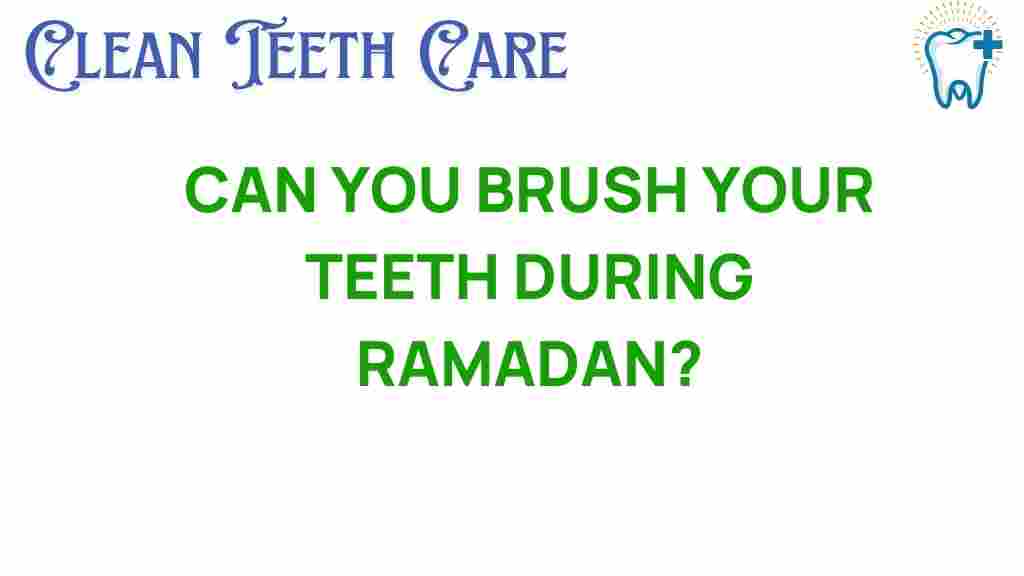The Ramadan Dilemma: Can You Brush Your Teeth While Fasting?
Ramadan is a holy month observed by millions of Muslims around the world, marked by fasting from dawn until sunset. This sacred practice is not only a time for spiritual reflection and prayer but also brings about discussions regarding daily activities that may affect one’s fasting. One common question during this time is: “Can you brush your teeth while fasting?” In this article, we will explore this dilemma, focusing on the importance of oral hygiene, dental care, and how to navigate cultural practices and beliefs during Ramadan.
Understanding Fasting During Ramadan
Fasting during Ramadan is one of the Five Pillars of Islam, which are essential acts of worship that define a Muslim’s faith and practice. Fasting, or **Sawm**, involves abstaining from food, drink, smoking, and intimate relations from the break of dawn (Fajr) until sunset (Maghrib). The primary purpose of fasting is to develop self-discipline, empathy for the less fortunate, and a deeper connection with God.
The Importance of Oral Hygiene
Maintaining good oral hygiene is crucial for overall health, especially during Ramadan when daily routines change significantly. Poor dental care can lead to various oral health issues, including cavities, gum disease, and bad breath. This raises the question: how can one maintain oral hygiene without breaking the fast?
Brushing Teeth and Fasting: The Debate
The act of brushing teeth while fasting is a topic of debate among scholars and practitioners. Here are the primary considerations:
- Beliefs: Some scholars believe that brushing teeth with toothpaste may invalidate the fast due to the ingestion of substances, while others argue that it is permissible as long as caution is exercised.
- Cultural Practices: In many cultures, maintaining fresh breath is essential, particularly during communal prayers and gatherings after iftar (the meal to break the fast).
- Health: Oral hygiene practices can significantly impact one’s health, and neglecting them can lead to discomfort and health issues.
Can You Brush Your Teeth While Fasting?
Most scholars agree that brushing teeth without swallowing toothpaste is permissible during fasting. Here are some key points to consider:
- Use of Water: Many agree that rinsing your mouth with water is allowed. It’s advisable to avoid swallowing any water or toothpaste.
- Toothpaste Choices: If you choose to use toothpaste, consider using a non-flavored or minimal quantity to avoid any risk of ingestion.
- Timing: Brushing your teeth before the fast begins (Suhoor) or after it ends (Iftar) is also a safe and effective option.
Step-by-Step Process for Brushing Teeth While Fasting
If you decide to brush your teeth while fasting, here’s a step-by-step guide to ensure you do it safely:
- Gather Your Supplies: Have your toothbrush and a small amount of toothpaste ready.
- Moisten Your Toothbrush: Dip your toothbrush in water without swallowing any.
- Apply Toothpaste: Use a minimal amount of toothpaste to reduce the risk of swallowing.
- Brush Gently: Brush your teeth gently, focusing on technique rather than force.
- Rinse Thoroughly: After brushing, rinse your mouth with water, being careful not to swallow any.
Hygiene Tips During Ramadan
Maintaining oral hygiene during Ramadan requires a bit of creativity and dedication. Here are some additional hygiene tips to keep your mouth healthy:
- Hydration: Drink plenty of water during non-fasting hours to keep your body hydrated, which is essential for saliva production.
- Healthy Eating: Include crunchy fruits and vegetables in your iftar meals, such as apples and carrots, to help clean your teeth.
- Mouthwash Alternatives: Consider using a mouthwash after iftar to freshen your breath and kill bacteria.
Common Concerns and Troubleshooting Tips
Even with good intentions, there may be concerns while brushing your teeth during fasting. Here are some common issues and tips to address them:
- Bad Breath: If you suffer from bad breath, try using a tongue scraper during non-fasting hours to clean your tongue, which can harbor bacteria.
- Gum Sensitivity: If your gums are sensitive, be gentle when brushing and consider using a soft-bristled toothbrush.
- Toothpaste Taste: If the taste of toothpaste is too strong, opt for a fluoride rinse instead, which can help protect your teeth without the need for brushing.
- Accidental Swallowing: If you are worried about swallowing toothpaste, practice rinsing with water and spitting it out without swallowing.
Conclusion: Balancing Fasting and Oral Hygiene
The Ramadan dilemma of whether one can brush their teeth while fasting highlights a broader conversation about the balance between personal health and religious practices. While the act of fasting is a significant spiritual journey, it is also essential to maintain oral hygiene to ensure overall health and well-being.
Ultimately, the choice to brush your teeth while fasting should be made with consideration of your beliefs, health, and comfort. By following the steps and tips outlined in this article, you can maintain your dental care routine without compromising your fast.
For more information on Ramadan traditions and health tips, check out this resource. Additionally, you may want to explore various cultural practices regarding fasting during Ramadan to gain a broader understanding of its significance.
This article is in the category Hygiene and created by CleanTeethCare Team
